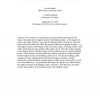Free Online Productivity Tools
i2Speak
i2Symbol
i2OCR
iTex2Img
iWeb2Print
iWeb2Shot
i2Type
iPdf2Split
iPdf2Merge
i2Bopomofo
i2Arabic
i2Style
i2Image
i2PDF
iLatex2Rtf
Sci2ools
DA
2010
2010
Procurement Auctions for Differentiated Goods
: We consider two mechanisms to procure differentiated goods: the request for quote and an English auction with bidding credits. In the request for quote, each seller submits a price and the inherent quality of his good. Then the buyer selects the seller who offers the greatest difference in quality and price. In the English auction with bidding credits, the buyer assigns a bidding credit to each seller conditional upon the quality of the seller's good. Then the sellers compete in an English auction with the winner receiving the auction price and his bidding credit. Game theoretic models predict the request for quote is socially efficient but the English auction with bidding credits is not. The optimal bidding credit assignment under compensates for quality advantages, creating a market distortion in which the buyer captures surplus at the expense of the seller's profit and social efficiency. In experiments, the request for quote is less efficient than the English auctions wi...
Bidding Credits | DA 2010 | English Auction | Seller |
Related Content
| Added | 10 Dec 2010 |
| Updated | 10 Dec 2010 |
| Type | Journal |
| Year | 2010 |
| Where | DA |
| Authors | Jason Shachat, J. Todd Swarthout |
Comments (0)

